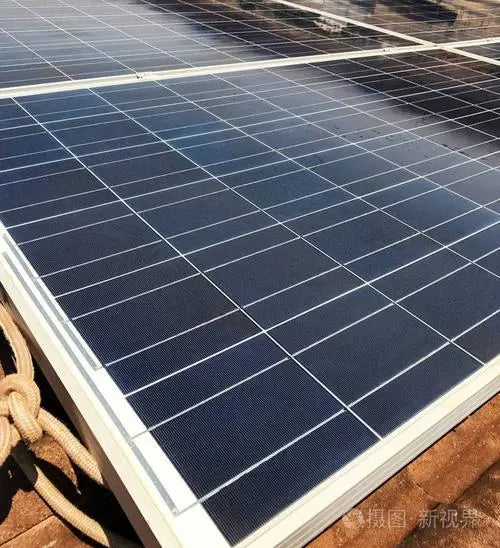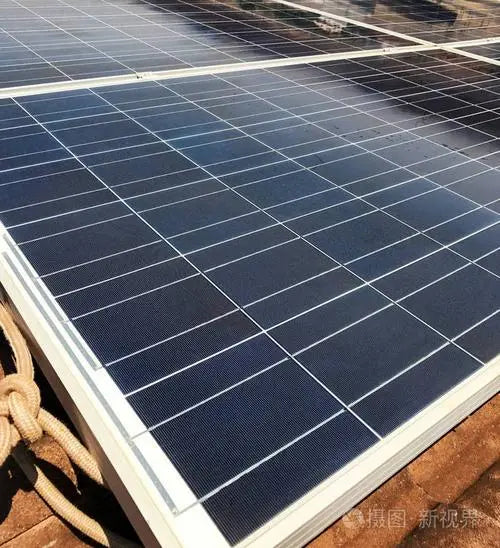Residential solar panels have become a hot topic as the problem of global climate change grows worse and more and more households are focusing on the use of renewable energy. As a green, eco-friendly energy solution, residential solar panels not only help reduce carbon emissions, but also save families money on their energy bills. Today, let's explore the mysteries of residential solar panels and see how it can contribute to your green home.
First, let's understand the basic composition and working principle of residential solar panels. Residential solar panels are mainly composed of photovoltaic cells that convert sunlight into direct current energy. Through a series of circuit connections and inverter conversions, the DC energy can ultimately be utilized by the home's electrical appliances. This process eliminates the need for fuel combustion and is completely zero-emission, making it both environmentally friendly and economical.
So what exactly are the advantages of residential solar panels? First of all, it can provide a steady supply of electricity to the home. As a renewable energy source, solar energy has the advantage of being constantly available, providing homes with a reliable supply of electricity even in areas where power supply is tight. Secondly, residential solar panels help in reducing the energy bills of the family. After installing solar panels, families can make full use of solar energy resources and reduce their reliance on traditional electricity, thus saving money on electricity bills. In addition, residential solar panels offer a high return on investment. Although the installation costs are relatively high, the financial benefits that solar panels can bring in the long run are substantial.
Of course, when choosing and installing residential solar panels, we also need to pay attention to some issues. First of all, it is important to choose the right type and capacity of solar panels according to the actual situation and needs of the family. Different solar panels differ in performance, price and other aspects, so we need to weigh and choose according to the actual situation. Secondly, the installation of solar panels needs to take into account factors such as the structure, orientation and shading of the house to ensure that the solar panels can fully receive the sunlight and give the best results. Finally, we also need to pay attention to the maintenance and upkeep of solar panels. Although solar panels have a long lifespan, regular cleaning and inspection can ensure their proper functioning and prolong their service life.
With the progress of science and technology and the improvement of environmental awareness, the application prospect of residential solar panels will be more and more broad. More and more families will choose to install solar panels, and together they will contribute to the environmental protection of the earth. At the same time, the government and all walks of life will also increase their support and investment in the solar energy industry, and promote the continuous innovation and development of solar energy technology.
In conclusion, residential solar panels, as a green and environmentally friendly energy solution, are gradually coming into tens of thousands of homes. It can not only provide a stable power supply for families and reduce energy expenses, but also has a high return on investment. In the future, with the continuous progress of technology and the expansion of the scope of application, residential solar panels will become an important part of the family's green life, contributing to our common guardianship of the Earth's homeland.
First, let's understand the basic composition and working principle of residential solar panels. Residential solar panels are mainly composed of photovoltaic cells that convert sunlight into direct current energy. Through a series of circuit connections and inverter conversions, the DC energy can ultimately be utilized by the home's electrical appliances. This process eliminates the need for fuel combustion and is completely zero-emission, making it both environmentally friendly and economical.
So what exactly are the advantages of residential solar panels? First of all, it can provide a steady supply of electricity to the home. As a renewable energy source, solar energy has the advantage of being constantly available, providing homes with a reliable supply of electricity even in areas where power supply is tight. Secondly, residential solar panels help in reducing the energy bills of the family. After installing solar panels, families can make full use of solar energy resources and reduce their reliance on traditional electricity, thus saving money on electricity bills. In addition, residential solar panels offer a high return on investment. Although the installation costs are relatively high, the financial benefits that solar panels can bring in the long run are substantial.
Of course, when choosing and installing residential solar panels, we also need to pay attention to some issues. First of all, it is important to choose the right type and capacity of solar panels according to the actual situation and needs of the family. Different solar panels differ in performance, price and other aspects, so we need to weigh and choose according to the actual situation. Secondly, the installation of solar panels needs to take into account factors such as the structure, orientation and shading of the house to ensure that the solar panels can fully receive the sunlight and give the best results. Finally, we also need to pay attention to the maintenance and upkeep of solar panels. Although solar panels have a long lifespan, regular cleaning and inspection can ensure their proper functioning and prolong their service life.
With the progress of science and technology and the improvement of environmental awareness, the application prospect of residential solar panels will be more and more broad. More and more families will choose to install solar panels, and together they will contribute to the environmental protection of the earth. At the same time, the government and all walks of life will also increase their support and investment in the solar energy industry, and promote the continuous innovation and development of solar energy technology.
In conclusion, residential solar panels, as a green and environmentally friendly energy solution, are gradually coming into tens of thousands of homes. It can not only provide a stable power supply for families and reduce energy expenses, but also has a high return on investment. In the future, with the continuous progress of technology and the expansion of the scope of application, residential solar panels will become an important part of the family's green life, contributing to our common guardianship of the Earth's homeland.


Hinterlasse einen Kommentar
Diese Website ist durch hCaptcha geschützt und es gelten die allgemeinen Geschäftsbedingungen und Datenschutzbestimmungen von hCaptcha.